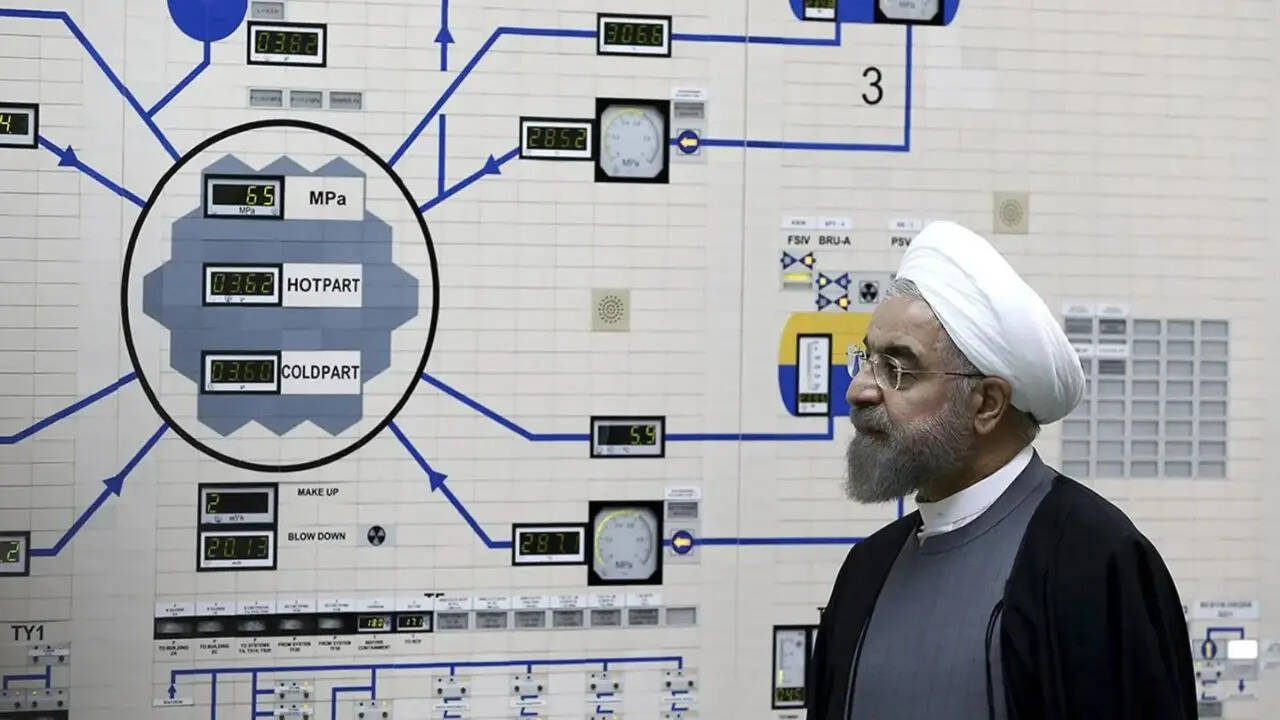
AP/File photo: Former Iran president Hassan Rouhani at Iran’s Bushehr nuclear power plant in 2015. Iran’s 2015 nuclear deal has ended, coinciding with the expiry of UN Security Council Resolution 2231 on Saturday.
Iran’s landmark 2015 nuclear deal has officially come to an end, coinciding with the end of UN Security Council Resolution 2231 on Saturday. The UN resolution had officially endorsed the nuclear deal.
Speaking about the collapse of the nuclear deal, Iran’s Foreign Ministry spokesman Esmail Baghaei said, “With the end of Resolution 2231 on October 18, its provisions have officially terminated,” with Tehran describing it as the final collapse of the Joint Comprehensive Plan of Action (JCPOA).
Baghaei told reporters at a weekly briefing that Iran had informed the UN about the expiry of the resolution, adding that the country’s nuclear rights, including uranium enrichment and research, “remain valid”.
He described the JCPOA as “a temporary and conditional understanding”, and accused the United States of violating international law by withdrawing from the agreement in 2018.
European governments, Baghaei said, had “failed to meet their own obligations” by following Washington’s lead.
“Iran had implemented the JCPOA in good faith and with full precision, while the United States had grossly violated international law by reimposing unilateral sanctions,” he wrote in a letter to the Secretary-General and the Security Council president.
Foreign Minister Abbas Araghchi also formally notified the UN that Iran would no longer adhere to its remaining commitments under the deal.
Iran’s Nuclear Deal Ends – What It Means
The expiry of Resolution 2231 means that the UN oversight of Iran’s nuclear activities has formally ended, removing the last layer of restrictions endorsed under the JCPOA.
Analysts say that the lapse effectively restores Iran’s freedom to enrich uranium, expand research, and pursue nuclear development without any international constraints.
For Western powers, the expiry of the resolution means the loss of a crucial diplomatic tool that had offered transparency and monitoring through the International Atomic Energy Agency (IAEA).
Observers warn that the absence of these mechanisms risk reigniting regional tensions and leading to a global fallout.
A Western diplomat noted that it “does not just close a chapter – it removes the last barrier to a new, uncertain phase”.
What Tehran Says About Its Nuclear Programme
Tehran, however, insists that its nuclear programme remains peaceful and within its sovereign rights. This is a stance backed by Russia and China, both permanent members of the Security Council.
What Is China and Russia’s Stance?
In a joint letter to the UN, Iran, China, and Russia stated that “in accordance with operative paragraph 8 of Resolution 2231, all its provisions are terminated after October 18, 2025,” marking “the end of the Security Council’s consideration of the Iranian nuclear issue”.
The allies accused the E3 – or European trio Britain, France, and Germany – of acting “illegally and without standing”, arguing that countries which had failed to meet their obligations under the JCPOA could not invoke its clauses.
The letter further criticised Western powers for “succumbing to American pressure” and halting trade with Iran despite earlier commitments to revive the deal.
With the end of UN oversight, Iran now operates without the final international checks previously guaranteed under the JCPOA. This could lead to a new, uncertain phase for regional and global security.
